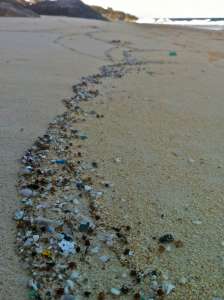Say No To Plastics
I use plastic. I recycle. What’s the issue?
Plastic is a durable material made to last forever, yet 33 percent of it is used once and then discarded. Unfortunately, plastic never goes away. Plastic cannot biodegrade and only breaks down into smaller and smaller pieces.
What about recycling? Americans alone discard more than 30 million tons of plastic a year; only 8 percent of it gets recycled. The rest ends up in landfills or becomes “litter.” Did you know that 80 percent of all marine debris found in the ocean is land-based, and that 80 to 90 percent of marine debris is made of plastic? Think about that trash you see on the side of the road; it flows to storm drains, which flow to rivers, and the trash ultimately lands in our oceans.

Plastics account for roughly 1 billion bird deaths each year, and around two-thirds of fish populations test positive for plastics. Plastic is not just a threat to wildlife; as plastic debris floats around the ocean, it begins to soak up harmful chemicals such as DDT that have leached into the ocean. In turn, when fish eat these plastics they are then contaminated themselves. Humans are then put in potential risk of ingesting chemicals that have been linked to impaired immunity, endocrine and cancer-related issues.
In addition, plastic affects human health through toxic leaching in landfills. There are thousands of landfills across the globe. In these landfills, plastics leak toxic chemicals that seep into groundwater, contaminating our streams, lakes, rivers and drinking water sources.
Even if you are recycling, that plastic can only be recycled and turned into something else one or two times. From there it is just trash, whereas if you choose a glass or aluminum container, that container can be recycled and remade for infinite uses.
The dirty, oily secret behind plastic …To make plastic you need oil, a non-renewable resource with an extraction process that is very harmful to our environment, animals and us! The process begins with fracking; fracking causes health issues and has therefor been banned in some U.S. states such as New York, Maryland and Vermont. After the oil is extracted, it’s then transported and then turned into plastic materials in a very energy-intensive process that involves burning a massive amount of fossil fuels, ultimately furthering the effects of climate change. The estimate for the amount of carbon released from plastic manufacturing is anywhere between 100 to 500 million tons of carbon per year. To provide perspective, that is between 19 to 92 million vehicles on the road. (Mackann, One Green Planet)
“We as a society need to consider whether it’s worth trading off some convenience for a clean, healthy environment.” (Geyer, National Geographic)
How can you help?
- Say no to single-use plastics like straws, shopping bags and food containers.
- Choose other materials instead of plastic. Look for glass, aluminum or paper options.
- BYOC! Bring your own container to the grocery store, weigh it so you can subtract that weight, and you’re good to go. Bring mason jars for coffee. Bring your own container for leftovers.
Header image provided by The 5 Gyres Institute.
Start small … say no to these two single-use plastics.
Straws
The average person uses 38,000 straws between age 5 and age 65.
Shopping Bags
Plastic shopping bags are used for an average of 12 minutes but will take up to 1,000 years to degrade.

Connect With Your Wild Side #onlyzooatl